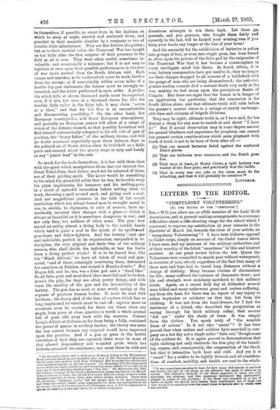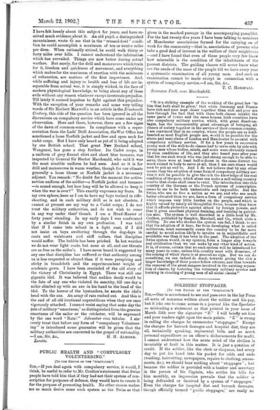LETTERS TO THE EDITOR.
"COMPULSORY VOLUNTEERING."
I.TH THE BDITOR OP THE " SPECTATOR:1
you allow me, as aflife member of the Lads' Drill Association, and at present making arrangements to overcome difficulties about a rifle-shooting range for the school which I represent, to express my satisfaction at. your remarks in the Spectator of March 1st, towards the close of your article, on " compulsory Volunteering " ? I have been hitherto opposed to Cadet corps, simply on account of the Cadet tunics which I have seen, 41.nd my mistrust of the .military authorities and of their worship of the fetish " smartness " in this and kindred matters.. At one great review before the late . Queen the Volunteers were compelled to march past without waterproofs in torrents of rain, utterly regardless of the fact that many of these men and boys had to travel long distances without a change of clothing. Many -became victims of rheumatism for life; many suffered the tortures of rheumatic fever; and life and strength were recklessly sacrificed to this military fetish. Again, on a recent field day at Aldershot several were killed and many underwent great and useless suffering, not from the heat, for there was no report of any injury to either haymaker or cricketer on that day, but from the clothing. It was not from the head-dresses, for had the• testimony of a friend, who described the perspiration as oozing through . his thick military collar, . that several "fell out " under the shade of trees. It was simply from the clothes. You speak truly of " the sensible dress of sailors." Is it not also " smart " ? • It has been proved that when sailors and soldiers haVe marched in com- pany on a hot day not a single sailor " falls out," thoigh some of the soldiers do. It is again proved to demonstration that tight clothing not only obstructs the free play of the breath- ing organs, and, consequently, the oxygenation of the blood, but that it intensifies both heat and cold. And yet it is " smart " for a soldier to be tightly dressed, and all considera- tions of comfort, mobility, and health are cast to the winds.
• It was sometimes amusing to hear for how many deficiencies in our luck and tactics the fact of our being on the offensive was made to serve as an excuse. The defensive attitude of the Boers appeared to many not only abnormal, but criniinal, and this unnatural micheaceti was particularly alleged. as unfair to our artillery ! If the Boers had attacked us in line of battle, no doubt we should have beaten them handsomely out of hand, but they would have sacrificed even the small claim to tactical •till to which they are entitled. I have felt keenly about this subject for years, and have re- ceived much evidence.about it. An old pupil, a distinguished mountaineer, wrote to me that in the " trussed-fowl " condi- tion he could accomplish a maximum of ten or twelve miles per diem. When rationally attired, he could walk thirty or forty miles over hills. I cannot understand the infatuation which has prevailed. Things are now better during actual warfare. But surely, for the drill and manoeuvres which train for it, freedom and quickness of movement, and everything which makes for the maximum of exertion with the minimum of exhaustion, are matters of the first importance. And, while suffering and injury to health and loss of life are in- separable from actual war, it is simply wicked, in the face of modern physiological knowledge, to bring about any of these evils without any reason whatever except inveterate prejudice. Till lately it seemed hopeless to fight against this prejudice. With the exception of your remarks and some very telling words of Sir Herbert Maxwell's in an article in the Nineteenth Century, this side of the question has been ignored in all the discussions on compulsory service which have come under my observation. Here and there, however, there are a few signs of the dawn of common-sense. In compliance with a repre- sentation from the Lads Drill Association, the War Office has sanctioned a loose Norfolk jacket and free and open neck for cadet corps. But I have only heard as yet of it being adopted by one British school. That great New Zealand school, Wanganui, has gone a step further. Its Cadet corps, in a uniform of grey flannel shirt and short blue trousers, was inspected by General Sir Hector Macdonald, who said it was the most sensible uniform he had seen. And so it is for drill and manoeuvres in warm weather, though for our climate generally • a loose blouse or Norfolk jacket is a necessary adjunct. You remark: "No doubt for the moment the active- service uniform of the soldier—a Norfolk jacket and trousers —is sound enough, but how long will he be allowed to keep it when the war is over?" This exactly expresses my fears. In my own sphere, keen as I am to have my boys trained in rifle- shooting, and in such military drill as is not obsolete, I cannot at present see my way to a Cadet corps ; I do not trust the military authorities, and do not wish to come in any way under their` thumb. I am a Head-Master of forty years' standing. In my early days I was confronted by a similar fetish in my own profession. I was told that if I came into school in a light coat, if I did not insist on boys sweltering through the dog-days in coats and waistcoats and stiff collars, that discipline would suffer. The bubble has been pricked. In hot weather we do not wear light coats, but none at all, and our throats are as free as the sailor's. I have never heard it suggested by any one that discipline has suffered or that authority among us is less respected or obeyed than if it were perspiring and sticky in broadcloth and the superincumbent weight of academic gown. I have been reminded of the old story of the victory of Christianity in Egypt. There was still one gigantic idol. It was believed that sudden death would be the fate of any one who violated its sanctity, till one day a sailor climbed up with an axe in his hand to the head of the idol. To the horror of the bystanders, he smote the idol's head with the axe. An army of rate rushed out. And this is the end of all old irrational superstitions when they are once vigorously attacked. I cannot resist saying that some day the fate of military "smartness," as distinguished from the genuine smartness of the sailor or the cricketer, will be expressed by the one word " Rata!" Solrountur riga tabutae. I sin- cerely trust that before any form of "compulsory Volunteer- ing" is introduced some guarantee will be given that the military authorities are converted to the gospel of rationality.











































 Previous page
Previous page